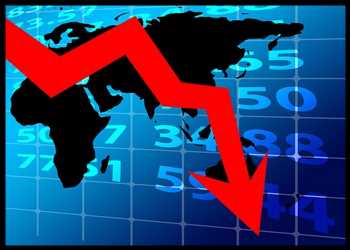Asian Markets Mostly Lower On Weak Wall Street Cues
Asian stock markets are trading mostly lower on Wednesday, following the broadly negative cues from Wall Street overnight, amid lingering concerns about the outlook for interest rates and the impact further rate hikes will have on the global economy. Trades now await comments from several US Fed officials, including Fed Chair Jerome Powell, as well as the central bank’s Beige Book for more cues. Asian Markets closed mixed on Tuesday.
The Australian stock market is sharply lower on Wednesday, extending the losses in the previous session, with the benchmark S&P/ASX 200 falling below the 6,800 level, following the broadly negative cues from Wall Street overnight, with weakness across most sectors as traders digested the fourth successive 50 basis points hike in cash rate by the Reserve Bank of Australia to the highest level since 2015.
The benchmark S&P/ASX 200 Index is losing 95.20 points or 1.40 percent to 6,731.30, after hitting a low of 6,719.60 earlier. The broader All Ordinaries Index is down 95.60 points or 1.36 percent to 6,960.30. Australian stocks ended modestly lower on Tuesday.
Among major miners, BHP Group is losing almost 2 percent, Mineral Resources is declining almost 3 percent and Fortescue Metals is slipping more than 3 percent, while OZ Minerals and Rio Tinto are down more than 1 percent each.
Oil stocks are lower. Santos, Origin Energy and Woodside Energy are losing almost 2 percent each, while Beach energy is declining more than 2 percent.
In the tech space, Afterpay owner Block and Zip are declining more than 2 percent each, while Xero is losing almost 2 percent and WiseTech Global is down almost 1 percent, while Appen is edging up 0.5 percent.
Among the big four banks, ANZ Banking is edging down 0.4 percent, National Australia Bank is losing almost 2 percent, Westpac is down more than 1 percent and Commonwealth Bank is declining almost 1 percent.
Among gold miners, Resolute Mining, Gold Road Resources and Newcrest Mining are losing almost 2 percent each, while Evolution Mining is declining more than 3 percent and Northern Star Resources is down more than 2 percent.
In economic news, Australia’s gross domestic product expanded 3.6 percent on year in the second quarter of 2022, the Australian Bureau of Statistics said on Wednesday. That exceeded expectations for an increase of 3.5 percent and was up from 3.3 percent in the previous three months. On a seasonally adjusted quarterly basis, GDP added 0.9 percent – shy of forecasts for an increase of 1.0 percent but still up from 0.8 percent in the three months prior.
In the currency market, the Aussie dollar is trading at $0.671 on Wednesday.
The Japanese stock market is significantly lower on Wednesday, giving up the gains in the previous session, with the Nikkei 225 falling below the 27,400 level, following the broadly negative cues from Wall Street overnight, with weakness in exporters and technology stocks as the yen tumbled.
The benchmark Nikkei 225 Index closed the morning session at 27,362.83, down 263.68 points or 0.95 percent, after hitting a low of 27,268.70 earlier. Japanese stocks closed slightly higher on Tuesday.
Market heavyweight SoftBank Group is losing more than 2 percent, while Uniqlo operator Fast Retailing is flat. Among automakers, Honda is gaining almost 1 percent, while Toyota is losing more than 1 percent.
In the tech space, Screen Holdings and Advantest are losing almost 3 percent each, while Tokyo Electron is declining more than 2 percent.
In the banking sector, Mizuho Financial is gaining almost 1 percent, while Mitsubishi UFJ Financial and Sumitomo Mitsui Financial are flat.
Among the major exporters, Sony is slipping more than 3 percent and Canon is losing almost 1 percent, while Panasonic and Mitsubishi Electric are declining more than 1 percent each.
Among the other major losers, Nippon Yusen K.K. is plunging almost 7 percent, while Kawasaki Kisen Kaisha and Mitsui O.S.K. Lines are losing more than 5 percent each. Sharp is down almost 5 percent, while Hitachi Zosen, Toho Zinc and Nikon are slipping more than 4 percent each. JGC Holdings and Inpex are declining almost 4 percent, while Taiyo Yuden, Idemitsu Kosan and Yamaha are sliding more than 3 percent each. Nippon Light Metal Holdings and M3 are down almost 3 percent each.
Conversely, Subaru is gaining almost 3 percent.
In the currency market, the U.S. dollar is trading in the mid-143 yen-range on Wednesday.
Elsewhere in Asia, Hong Kong, South Korea and Taiwan are lower by between 1.1 and 1.6 percent each, while New Zealand, Malaysia, Singapore and Indonesia are lower by between 0.1 and 0.7 percent each. China is bucking the trend and is up 0.2 percent.
On Wall Street, stocks showed a lack of direction over the course of the trading session on Tuesday after an initial move to the upside. The major averages bounced back and forth across the unchanged line before ending the day firmly negative.
The major averages finished the session at their worst closing levels in well over a month. The Dow fell 173.14 points or 0.6 percent to 31,145.30, the Nasdaq slid 85.96 points or 0.7 percent to 1,544.91 and the S&P 500 dipped 16.07 points or 0.4 percent to 3,908.19.
Meanwhile, European stocks finished a choppy session mostly higher. While the German DAX Index advanced by 0.9 percent, the French CAC 40 Index and the U.K.’s FTSE 100 Index both edged up by 0.2 percent.
Crude oil futures settled barely higher on Tuesday after the decision by OPEC+ to cut output by 100,000 barrels per day in October, although the dollar’s uptick limited oil’s upside. West Texas Intermediate Crude oil futures for October ended higher by a penny or $0.09% at $86.88 a barrel.
Source: Read Full Article

